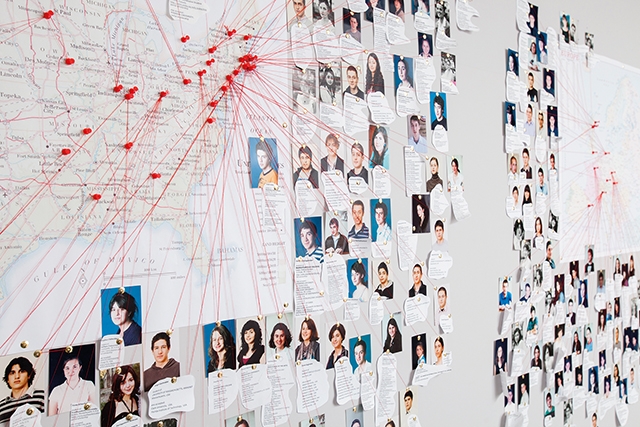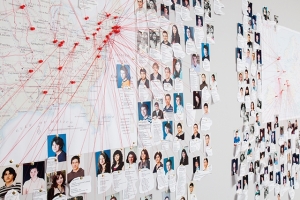The Graduates of American Academy Enrolled in World's Top Universities
INTERVIEW
The Guivy Zaldastanishvili American Academy in Tbilisi (GZAAT) is a private high school educating 375 students in grades 8 through 12. The mission of the school is to help bring Georgia into the 21st century by preparing its children to compete on a global scale, both locally and in schools abroad.
The American Academy is proud of the manner in which it assists students in the area of university placement. 90% of its graduates go on to universities in the US, UK, Canada, and Europe. The number of students admitted to top ranked universities and colleges is impressive, as is the amount of financial aid which has been awarded to its students.
This year, GZAAT had 70 graduates who have been remarkably successful, gaining entrance to 156 of the best universities in the world, with a total of 5,909.042 GEL in scholarships awarded in a single year.
This year’s college acceptances to the USA and EU
USA - Yale University, Grinnell College, Vassar College, Babson College, Bates College, NY University in New York and Abu Dhabi, Lehigh University, Boston College, Emory University, Boston University, Brandeis University, Northeastern University, Bard College, George Washington University, Rochester Institute of Technology, Southern California University, Worchester Polytechnic Institute, Mount Holyoke, College, etc.
Europe - Bocconi University in Milan, Erasmus University Rotterdam, Jacobs University Bremen, Madrid Business University, King’s College London, Charles University in Prague, etc.
Eager to learn how exactly the high school manages to raise students this successful, GEORGIA TODAY interviewed two of the GZAAT 2020 graduates, Misho Gabashvili, and Rezi Getsadze.
Misho was accepted to Yale University in New Haven, Connecticut, USA, with an 80% scholarship of $67,000. Rezi got a full scholarship worth approximately $76,000 to continue his studies in the New York University Abu Dhabi, in Abu Dhabi, United Arab Emirates.
How big was the role of GZAAT in your enrolment in your respective universities?
Misho: It was the resources provided by the American Academy that gave me the ultimate opportunity to represent myself as an applicant worthy of acceptance to the Yale University. The academic experience and extracurricular activities offered by the academy are noteworthy, but the deciding factor, of course, comes down to you making the best of these resources. From my personal experience, I can say that in four years of hard work and self-development, I felt tremendous support from my school.
Rezi: The school played a big role in my enrolment. The knowledge and experiences I have gotten in school throughout the years conditioned my acceptance in the NYU University in Abu Dhabi. The universities in Europe and America demand a lot of technical information about the student, such as academic excellence sheets, financial standing, a list of extracurricular activities, recommendation letters… There are also tests and personal statements that need to be taken and written. When getting ready to submit my application, American Academy was a tremendous help for me not only in the “technical” sides of applying, but the individualized part of the application form. We have a class called Critical Reading, and the skills I honed during these lessons helped me succeed in my SATs. The American Academy also provides lessons for SATs, which serve as a good basis for students to get high scores. They began teaching us the system of submitting applications to foreign universities in 10th grade, and from the 11th grade, we had a personal counsellor who helped us choose the right university based on our personal preferences and guided us on the right steps to get enrolled. My own counsellor was Keti Chikovani, and without her kind assistance and the “training” that our school provided to get us ready for every step of our college enrolment, I imagine it would have been nearly impossible to make it. Even my personal statements were “inspired” by the subjects learned at school. The education I got in the American Academy played a great role in formulating my personality, and so even my personal essay was inspired by the point of view of the world that I developed thanks to the literature that we covered during the English classes.
What are some special skills GZAAT supplied you with that you don’t think you could have gotten in any other school?
Misho: I think studying in the American Academy had me develop many important skills. I personally had the biggest progress in writing and analytical thinking, and I believe that would not have happened if it weren’t for my teachers and their special approach. The teachers of the American Academy spare no efforts to support the individual-thinking of a student. They pushed me to think independently and come back with analytical conclusions drawn from the material we were covering.
Rezi: It has diversified my philosophy of life and has helped me develop critical thinking. What I loved most was the diverse education that our school constructed, and the way they orchestrated the teaching process so that the same themes would be covered in different subjects. I’ll give an example. We covered the topic of “heroism” in one class, based on the works of Remarque, and reached a negative conclusion; simultaneously, we covered the same topic in the Russian class based on the works of Maxim Gorky and others, which led us to a positive outlook on the theme. Then we had Freud’s psychology in a totally different class which explained the phenomenon and helped us lean towards one outlook or the other, or form a completely new one. The school gave me unbiased knowledge; one that gave me the freedom to master a particular topic and independently reach conclusions and my point of view on it.
We had another class where we covered ‘big ideas’ of ‘big people’ where we touched upon the ideas of everyone that mattered in local and international history, from Galileo to Merab Mamardashvili. What was more important was that we brought those ideas to the contemporary world and created projects inspired by these ideas.
In sum, the American Academy taught me how to connect different aspects of knowledge to form my own interests and wishes for the future, which got me ready for my future profession and college.
Do you have any hobbies and do you connect the spectrum of your diverse interests to the high school?
Misho: I love painting. It’s probably been ten years since I took it up. Other than that, I’m interested in philanthropy and the study of social/global problems. In the American Academy, I was blessed with the opportunity to get first-hand experience during the extracurricular activities and broaden my knowledge in these and other fields. I have to underline that during my years in the high school, based on the materials that we were covering and the clubs they had, I discovered various academic interests like sociology and political sciences.
Rezi: I believe the greatest skill the American Academy helped me develop was the ability to work on my own on something that interests me. Thanks to this, I discovered new interests, and now I’m planning on continuing my studies in the field of Physics. It took me a great deal of research, internships, and online classes, to reach this conclusion!
I have grown used to educating myself in various fields, further helping me establish how I view the world I live in. I mean this personally and globally. We have covered some material about the themes of race, upon which I built on my own research: the books of Alice Walker and educational movies. Now I feel more ready and confident to join the multicultural society in my future university in Abu Dhabi, and develop friendships with people from different cultural backgrounds.
The GZAAT syllabus is different from other schools of Georgia. What advantages do you think the academic approaches, like the Harkness method, of the American Academy have?
Misho: In my opinion, the Harkness method has many advantages, one of them being gaining knowledge through discussion. This approach makes the learning process dynamic and memorable. In American Academy in Tbilisi, it’s hard for a student to make a prognosis on how the class is going to go, and that additionally sparks his/her interest. As a result, a split in ideas is often the case during the lessons, as is the generalization of the particular material that is being covered. Thanks to the Harkness method, I have developed and honed many skills, including the ability to argue and communicate.
Rezi: I admire the Harkness method, since it contradicts the methods of teaching very popular in Georgian schools. When I started going to the American Academy, I had to leave my comfort zone which I had grown accustomed to in other schools, that is, merely sharing the views and conclusions of my teachers, studying only when I knew I would be called to the board. The education you get from the Harkness method is a result of teamwork: it is demanded that each student participates in the discussion, asks questions, and get to the bottom of the given material. The teacher’s main function in this method is to deliver the material to the students and control if we are rightly following it, rightly completing the task. The American Academy way transfers the learning process from “homework” to pleasure.
The interdisciplinary approach of the school, and mandatory classes in literature, philosophy, history, religion, etc., encourages the students to form as “humans” and “civilians” and continue our educational journey into colleges. Since I have been given this opportunity, I’d like to thank my school and teachers, thanks to whom I got to live my dream of being accepted at one of the most prestigious universities in the world, where I will be able to master the profession of my interest.
By Nini Dakhundaridze












